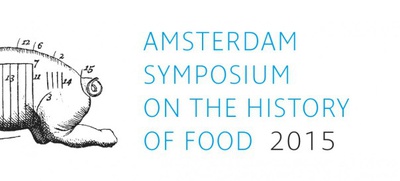RHN 142/2014 | Event
Organising Committee: Filip Degreef; Paul Koopman; Antonia Mazel; Joke Mammen; Nathalie Parys; Garrelt Verhoeven
16-17 January 2015, University of Amsterdam, Netherlands
Amsterdam Symposium on the History of Food 2015
Food, Hunger and Conflict
The Amsterdam Symposium on the History of Food has the aspiration to become an annual point of assembly and an exchange of knowledge in the field of the food history. It intends to stimulate debate and research that bridges the gap between different disciplines. Another aim is to transfer academic research to a wider public and stimulate research using the Special Collection of the University of Amsterdam. The symposium is therefore targeted at both an academic and a professional audience.
The Amsterdam Symposium on the History of Food is the result of a collaborative partnership between the Special Collections, University of Amsterdam, the Amsterdam School for Culture and History, University of Amsterdam and the research unit Social & Cultural Food Studies (FOST) of the Vrije Universiteit Brussel.
Food, Hunger and Conflict
When in today’s world we are confronted with the suffering of the hungry, we see them as victims in need of support, whether we pass them in the street or see distant strangers on the news. The study of the concept of hunger has shown that we cannot take this vision for granted. James Vernon indicated that it is the result of history of changing ideas surrounding the concept of hunger. Whilst it once was seen as the unavoidable hand of God, this later changed to a discourse of morality and individual responsibility. Those without food were seen as lacking discipline and in need of education.
The foregoing indicates that a need arises to understand definitions of what hunger represented for both those with and those without access to food to comprehend social and cultural interactions and political operations. Research into different sources can shed light on how existing ideas on poverty and hunger interacted with discourses and perceptions, strategies for survival, charity and aid to grasp what it meant economically, politically but also socially and culturally to be without food during times of prosperity, shortages, conflict and war. Through the mediation of the study of hunger strikes for example, one can study relationships of power, frameworks of culturally defined ideas of resistance, bodily integrity, sacrifice and social dynamics. Different experiences and cultural framing have significant effects on perception and remembrance of hunger, power, poverty and war.
Keynote speaker is Professor Josep L. Barona Vilar. Professor Barona is a specialist on the history of nutrition and public health. He is the author of From Hunger to Malnutrition. The Political Economy of Scientific Knowledge in Europe, 1918-1960, The Problem of Nutrition. Experimental Science, Public Health and Economy in Europe, 1914-1945, and many other publications on the subject.
Programme and more information: http://bijzonderecollectiesuva.nl/foodhistory/amsterdam-symposium-on-the-history-of-food/
Source: www.historici.nl
